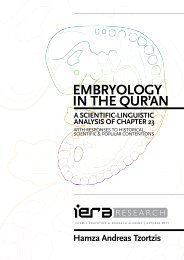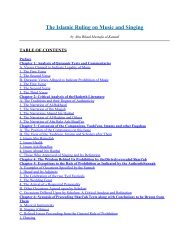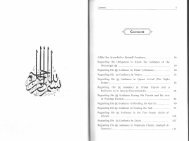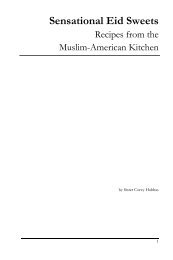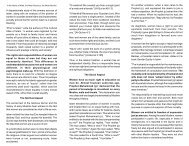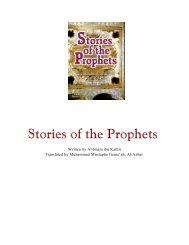Evolution of Fiqh - Mission Islam
Evolution of Fiqh - Mission Islam
Evolution of Fiqh - Mission Islam
- No tags were found...
Create successful ePaper yourself
Turn your PDF publications into a flip-book with our unique Google optimized e-Paper software.
Qabeelat Tayybah2. Different Divisions <strong>of</strong> Knowledge and <strong>Islam</strong>ic SciencesDespite the fact that we’ve lost a lot <strong>of</strong> books <strong>of</strong> <strong>Islam</strong>ic Sciences when the Mongols wiped out the <strong>Islam</strong>iclibraries in Iraq, we are still left with a huge legacy <strong>of</strong> knowledge. All can be divided into 2 cateogries:iUloom al Ghayyaat (Teleological Sciences, or Sciences <strong>of</strong> a Purpose): Studying them should bea goal, not just a means. Examples include the Qur’an ,the sunnah, Aqeedah, <strong>Fiqh</strong>, and Akhlaaq.ii Uloom al Wasaa’il (Instrumental sciences): Branches <strong>of</strong> <strong>Islam</strong>ic sciences, which the scholarshave developed to support the understanding <strong>of</strong> the sciences <strong>of</strong> a purpose. For Quran: Arabic, Tafseer, Fundamentals <strong>of</strong> Tafseer, Tajweed, Uloom alQur’an For Hadith: Usool al hadith, Usool al fiqh, Uloom al Arabia3. <strong>Fiqh</strong>, the Master <strong>of</strong> All <strong>Islam</strong>ic Sciences. Why?Some scholars considered <strong>Fiqh</strong> the most honorable science because it takes from all other branches <strong>of</strong>Shari’ah. For example, fuqaha’ study the Qur’an and Hadith to deduce laws <strong>of</strong> fiqh. The Qur’an speaksabout matters <strong>of</strong> Aqeedah, commandments and prohibitions, and stories <strong>of</strong> the past and future. Sincecommandments and prohibitions are matters <strong>of</strong> fiqh, some scholars say that fiqh is 1/3 <strong>of</strong> our deen.Generally, <strong>Fiqh</strong> is the practical implementation <strong>of</strong> the Qur’an and Sunnah.4. <strong>Fiqh</strong> as Fard al-‘Ayn (Individual Obligation)There are many aspects <strong>of</strong> fiqh that are considered an individual obligation, meaning that it is an obligationupon each individual to learn and implement properly. The scholars call this the minimum you must know.You will be held accountable for this minimum. In addition, that which allows you to fulfill somethingobligatory becomes obligatory in itself. Examples include wudu’, Salaah, Fasting, etc. Others don’t becomean individual obligation until certain conditions are met first. Hajj becomes fard ‘Ayn when you have themeans to go (i.e. money, visa, health, etc). At this point it is obligatory to learn the rules <strong>of</strong> Hajj. Don’tdepend on your guide because he won’t necessarily be able to help you; it’s very easy to get lost during hajj.The same goes for Zakah, marriage, and business transactions. Umar Ibn Khataab would beat people out <strong>of</strong>the market and tell them to go to the Masjid to learn the fiqh <strong>of</strong> trade before coming to the markets.5. <strong>Fiqh</strong> as Fard al-Kifayah (Community Obligation)Fard al-Kifayah is an obligation upon the community as a whole. If no one in the community performs it,then the whole community is sinful. If some members perform it, then that will be sufficient and the liabilitywill be removed from the whole community. An example <strong>of</strong> that is the funeral prayer.Ibn Taymiyyah mentioned that people are like birds, they flock together, they see other people and they imitatethem. By looking around and seeing how others pray, they begin practicing in the same way. It is important toknow how and why we practice our deen the way we do. When we reach the age <strong>of</strong> puberty, we need to learnand verify whether what we learned in our childhood (from parents, elders, etc.) is correct.TCE Notes Revolution 4



